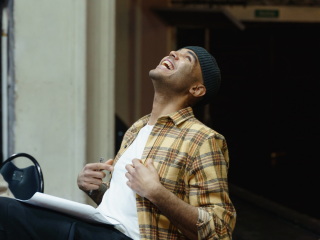Your audition’s going great – you nailed your 16 bars, they laughed at your monologue, and everyone was smiling after you read your sides. You’re ready to say, “thank you” and successfully walk out the door. But then the director says, “That was great, could you do it again, but this time…” and then she gives you an adjustment.

The first thing you need to understand in this moment is why the director is giving you an adjustment. Although all casting directors and directors will have different motives, most of the time the reasons fall into three basic categories:
- To see how well you listen
- To see if you’re stuck in one interpretation
- To see how well you can think on your feet
A surprising number of actors can give great presentations of their audition material (which, of course, they have had time to work on and prepare), but when that same actor is asked to present the material in a different way (and they are given little to no time to prepare), they crash and burn. So, what do you need to know so you can be prepared to take an adjustment in an audition situation?
First you need to make sure you accurately heard what you’re being asked to do. When you’re in audition mode you’ve often got adrenaline and/or nerves and that can make it hard to listen. It’s okay to ask questions and clarify what you’re being asked to do.
Then, you need to decide how to translate the adjustment you’ve been given to the material. When you’re used to performing material one way, it’s very easy to get stuck in that interpretation. The director may just want to make sure you are able to do something else with it.
Let’s say you’re auditioning for the role of Charlie Brown in You’re A Good Man, Charlie Brown. You have prepared Charlie Brown’s monologue that begins, “I think lunchtime is about the worst time of day for me.” The first time you present it, you chose the action “to encourage myself” since Charlie Brown spends most of the monologue trying to get up the nerve to go talk to the little red-haired girl across the lunchroom. After your first time through, you’re given the adjustment, “Play it like he has a lot of confidence and pretend he doesn’t care if the little red-haired girl likes him or not.”
Don’t waste time thinking, “Well, that doesn’t make any sense because Charlie Brown is a character with low self-esteem.” Directors don’t always give adjustments because they think that’s how the character should be played onstage. Remember the three reasons from above. Instead of spending time pondering the logic of what you were asked to do, quickly figure out how best to apply it to your material.
You probably won’t have too much time to think about how to take the adjustment before you actually have to do it. Most of the time you won’t even leave the audition room, so your best bet is to just fully commit to whatever choice you make.
If you’re being asked to make a different choice than you did in your first performance — make sure you make it noticeable and dramatically different. Don’t get stuck in the cadences of your earlier reading.
If taking adjustments is not a skill you’re particularly good at – you should practice it. Save some sides and challenge yourself to perform them multiple times using contrasting actions (you can look up lists of action words on the web). You should practice taking adjustments with monologues as well as songs.
For example, let’s say your audition song is “Waiting For Life” from Once on This Island.
You may have originally chosen the intention “to break free” because Ti Moune desperately wants to drive away and find her purpose. Once you’ve performed the song once with that action, figure out what the antonym (opposite) would be. You could try “to confine” and work on her feelings of being trapped. When applying adjustments to songs, an intention shift will most certainly change your dynamics. Sections that may have been strong and exuberant on your first sing through now might be tentative and quiet. Notice how different verbs naturally change the feel of the music.
More time in the audition room should always be looked at as an opportunity. A lot of actors squander the chance to perform their material again and wind up performing it the same way twice. Don’t make that mistake. I like the motto: “Go big or go home.” Take a chance and commit 100%. The only wrong choice is not to make a choice.
















1 comment
Everyone have chance to do what they want to do they all have time to make a good choice or bad choice but one thing everyone do is think what they all doing if is right it wrong thing one thing I can tell them is to keep it up and do the good choice everytime.